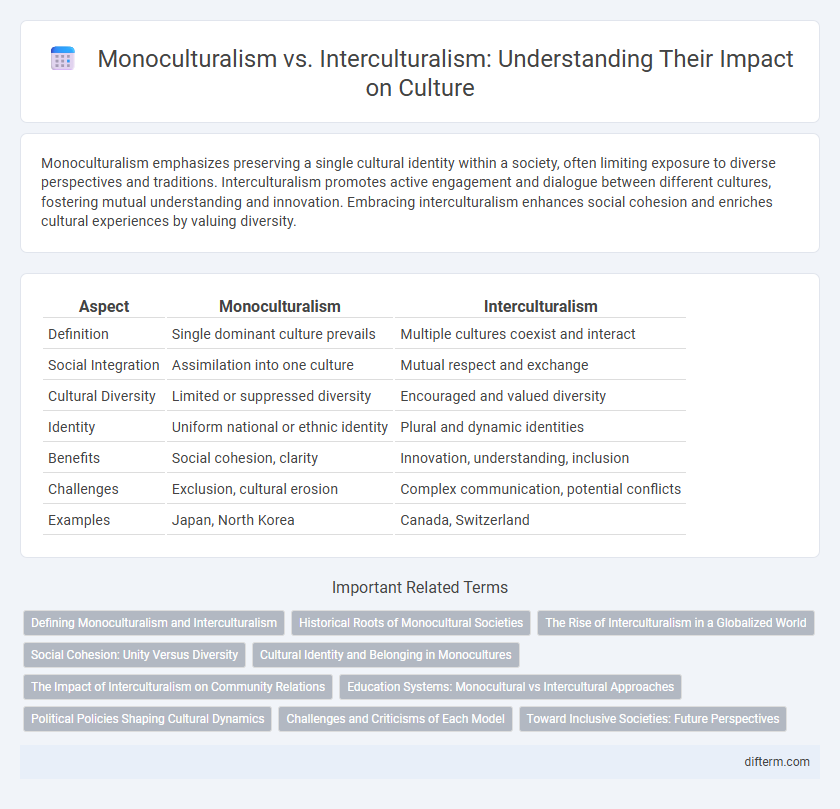Monoculturalism emphasizes preserving a single cultural identity within a society, often limiting exposure to diverse perspectives and traditions. Interculturalism promotes active engagement and dialogue between different cultures, fostering mutual understanding and innovation. Embracing interculturalism enhances social cohesion and enriches cultural experiences by valuing diversity.
Table of Comparison
| Aspect | Monoculturalism | Interculturalism |
|---|---|---|
| Definition | Single dominant culture prevails | Multiple cultures coexist and interact |
| Social Integration | Assimilation into one culture | Mutual respect and exchange |
| Cultural Diversity | Limited or suppressed diversity | Encouraged and valued diversity |
| Identity | Uniform national or ethnic identity | Plural and dynamic identities |
| Benefits | Social cohesion, clarity | Innovation, understanding, inclusion |
| Challenges | Exclusion, cultural erosion | Complex communication, potential conflicts |
| Examples | Japan, North Korea | Canada, Switzerland |
Defining Monoculturalism and Interculturalism
Monoculturalism refers to the dominance or exclusive presence of a single culture within a society, often emphasizing uniform cultural norms, values, and traditions. Interculturalism promotes interaction and dialogue between diverse cultural groups, encouraging mutual respect and understanding while valuing cultural differences. This approach fosters social cohesion by integrating multiple cultural perspectives into shared community experiences.
Historical Roots of Monocultural Societies
Monocultural societies often trace their origins to geographic isolation and homogeneous population groups that fostered a strong, unified cultural identity over centuries. Historically, limited external contact and rigid social structures reinforced singular cultural narratives, privileging a shared language, religion, and customs. This cultural insularity shaped national policies and social norms, impacting contemporary attitudes toward diversity and intercultural exchange.
The Rise of Interculturalism in a Globalized World
Interculturalism has surged as a dynamic response to the challenges posed by globalization, promoting dialogue and exchange between diverse cultural groups. This approach emphasizes mutual respect, understanding, and integration while valuing cultural differences instead of enforcing assimilation found in monoculturalism. Global cities like Toronto and Singapore exemplify successful intercultural models fostering social cohesion and economic innovation in multicultural environments.
Social Cohesion: Unity Versus Diversity
Monoculturalism emphasizes social cohesion through shared norms and a unified cultural identity, fostering a sense of solidarity but potentially limiting diversity and innovation. Interculturalism promotes unity by encouraging dialogue and mutual respect among diverse cultural groups, enhancing social cohesion through inclusivity and pluralism. Balancing unity and diversity, interculturalism supports dynamic social integration while maintaining cultural distinctiveness within a cohesive society.
Cultural Identity and Belonging in Monocultures
Monoculturalism emphasizes a singular cultural identity, fostering strong group cohesion and a clear sense of belonging within homogeneous communities. This approach often leads to stability and preservation of traditions but can limit exposure to diverse perspectives and hinder intercultural understanding. The reinforcement of a dominant cultural narrative may marginalize minority voices, affecting social inclusion and cultural dynamism.
The Impact of Interculturalism on Community Relations
Interculturalism fosters inclusive community relations by promoting dialogue, mutual respect, and cultural exchange, which reduces stereotypes and social tensions. Unlike monoculturalism, which often leads to cultural segregation and limited understanding, interculturalism encourages dynamic interactions that enhance social cohesion and collective identity. Studies show communities embracing interculturalism experience greater social capital, improved trust among diverse groups, and stronger collaborative networks.
Education Systems: Monocultural vs Intercultural Approaches
Monocultural education systems often emphasize a single dominant cultural perspective, limiting students' exposure to diverse worldviews and potentially reinforcing ethnocentric biases. Intercultural approaches integrate multiple cultural narratives within curricula, promoting critical thinking, empathy, and global awareness among students. Incorporating intercultural competence in education enhances social cohesion and prepares learners for participation in diverse, interconnected societies.
Political Policies Shaping Cultural Dynamics
Political policies that promote monoculturalism often enforce a singular national identity, limiting the recognition and expression of diverse cultural groups within society. In contrast, interculturalism policies encourage dialogue, inclusion, and mutual respect among different cultures, fostering social cohesion and equitable representation. Governments adopting intercultural frameworks tend to implement educational reforms and anti-discrimination laws that shape more dynamic, pluralistic cultural landscapes.
Challenges and Criticisms of Each Model
Monoculturalism faces criticism for fostering ethnocentrism, limiting social cohesion, and marginalizing minority groups, which can lead to cultural isolation and prejudice. Interculturalism confronts challenges such as managing cultural conflicts, balancing integration with cultural preservation, and addressing power imbalances among diverse communities. Both models must navigate complexities in policy implementation and societal acceptance to promote harmonious coexistence in multicultural societies.
Toward Inclusive Societies: Future Perspectives
Monoculturalism restricts social cohesion by prioritizing a single cultural norm, which limits diversity and innovation, whereas interculturalism fosters dialogue and mutual respect among varied cultural groups, enhancing societal resilience. Future perspectives emphasize policies promoting intercultural education and inclusive public spaces to build shared identities while respecting differences. Embracing interculturalism contributes to sustainable development goals by creating equitable access to opportunities and reducing social inequalities.
monoculturalism vs interculturalism Infographic

 difterm.com
difterm.com